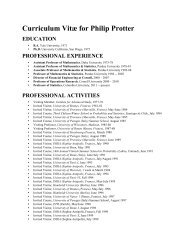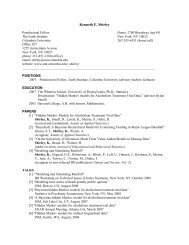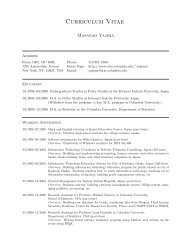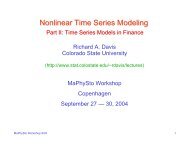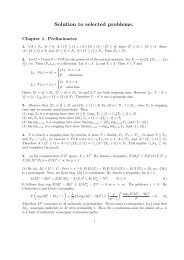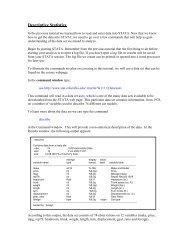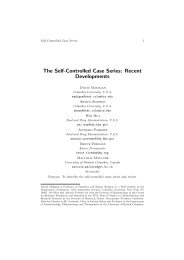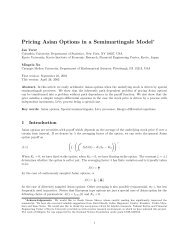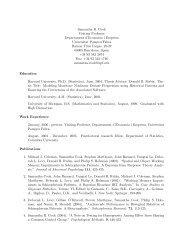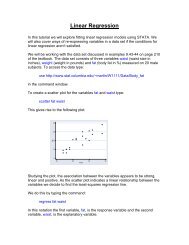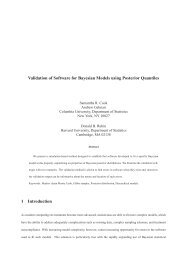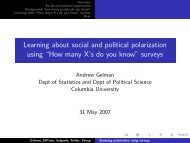sinning in the basement: what are the rules? the ten commandments ...
sinning in the basement: what are the rules? the ten commandments ...
sinning in the basement: what are the rules? the ten commandments ...
You also want an ePaper? Increase the reach of your titles
YUMPU automatically turns print PDFs into web optimized ePapers that Google loves.
APPLIED ECONOMETRICS 581<br />
<strong>the</strong>orems, new policies, sagacious economic reason<strong>in</strong>g, historical perspective,<br />
relevant account<strong>in</strong>g: <strong>the</strong>se have all led to scientific success. Statistical<br />
significance has not.<br />
Leamer (1996, p. 176) believes that an important reason for this state of affairs is<br />
that<br />
A distress<strong>in</strong>g amount of data analysis proceeds without benefit of any clear<br />
questions. When <strong>the</strong> questions <strong>are</strong> not explicitly on <strong>the</strong> table it is easy to<br />
fantasize that models <strong>are</strong> ei<strong>the</strong>r true or false when <strong>in</strong> fact <strong>the</strong>y <strong>are</strong> sometimes<br />
useful for answer<strong>in</strong>g <strong>the</strong> questions and sometimes mislead<strong>in</strong>g.<br />
He ma<strong>in</strong>ta<strong>in</strong>s that <strong>the</strong> <strong>in</strong>terest<strong>in</strong>g questions <strong>are</strong> not sharp hypo<strong>the</strong>ses <strong>in</strong> which <strong>the</strong><br />
null takes <strong>the</strong> form of a specific parameter value (because all such hypo<strong>the</strong>ses <strong>are</strong><br />
surely false), but ra<strong>the</strong>r that <strong>the</strong> questions economists deal with, or should be<br />
deal<strong>in</strong>g with, <strong>are</strong> neighborhoods of specific parameter values. Recogniz<strong>in</strong>g this<br />
can alleviate many of <strong>the</strong> criticisms of significance test<strong>in</strong>g.<br />
A promis<strong>in</strong>g attitude towards this problem is articulated by Milton Friedman,<br />
as quoted by Hamermesh (2000, p. 376):<br />
I have long had relatively little faith <strong>in</strong> judg<strong>in</strong>g statistical results by formal<br />
tests of significance. I believe that it is much more important to base<br />
conclusions on a wide range of evidence com<strong>in</strong>g from different sources over a<br />
long period of time.<br />
Sanctification via significance test<strong>in</strong>g should be replaced by searches for<br />
additional evidence, both corroborat<strong>in</strong>g evidence, and, especially, disconfirm<strong>in</strong>g<br />
evidence. If your <strong>the</strong>ory is correct, <strong>are</strong> <strong>the</strong>re testable implications? Can you<br />
expla<strong>in</strong> a range of <strong>in</strong>terconnected f<strong>in</strong>d<strong>in</strong>gs? Can you f<strong>in</strong>d a bundle of evidence<br />
consis<strong>ten</strong>t with your hypo<strong>the</strong>sis but <strong>in</strong>consis<strong>ten</strong>t with alternative hypo<strong>the</strong>ses?<br />
Abelson (1995, p. 186) offers some examples. A related concept is encompass<strong>in</strong>g:<br />
Can your <strong>the</strong>ory encompass its rivals <strong>in</strong> <strong>the</strong> sense that it can expla<strong>in</strong> o<strong>the</strong>r models’<br />
results? See Hendry (1988). Zellner (1992) recommends mak<strong>in</strong>g a special effort to<br />
obta<strong>in</strong> unusual facts.<br />
Rule #10: Report a sensitivity analysis.<br />
Everyone knows, as expressed by Weick (1992, p. 100), that<br />
Presentations of research f<strong>in</strong>d<strong>in</strong>gs <strong>are</strong> usually notoriously mislead<strong>in</strong>g accounts<br />
of how <strong>the</strong> research itself was conducted.<br />
Because of this it is very difficult for readers of research papers to judge <strong>the</strong> ex<strong>ten</strong>t<br />
to which data m<strong>in</strong><strong>in</strong>g may have unduly <strong>in</strong>fluenced <strong>the</strong> results. Indeed, results<br />
ta<strong>in</strong>ted by subjective specification decisions undertaken dur<strong>in</strong>g <strong>the</strong> heat of<br />
econometric battle should be considered <strong>the</strong> rule, as John Maynard Keynes (1940,<br />
p. 155) recognized long ago:<br />
It will be remembered that <strong>the</strong> seventy translators of <strong>the</strong> Septuag<strong>in</strong>t were shut<br />
up <strong>in</strong> seventy separate rooms with <strong>the</strong> Hebrew text and brought out with<br />
# Blackwell Publishers Ltd. 2002



